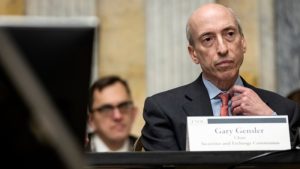France pushes Brussels to delay looming fines on carmakers
France has said carmakers should be spared from fines that will be imposed for insufficient efforts to increase the share of electric vehicles in their fleets, in a challenge to EU emissions rules.
Finance minister Antoine Armand told Les Echos that France would press the European Commission to reconsider penalties set to be phased in starting from 2026, while seeking to rally other countries to its position.
“I believe that manufacturers who are firmly committed to vehicle electrification should not have to pay fines,” Armand said on Monday.
The new EU rules come into force next year and require carmakers to cut carbon emissions by increasing the proportion of electric and hybrid vehicles sold — or face large fines.
By the end of next year, the industry is supposed to have reduced emissions by 15 per cent compared with a 2021 baseline, which companies estimated would require them to sell one EV for every four traditional cars.
The law was enacted in 2019 after being approved by a majority of member states. It sets gradual emissions reduction targets before a full ban on combustion engine cars powered by fossil fuels kicks in in 2035.
But a number of carmakers, including France’s Renault and Germany’s BMW, have pressured Brussels to delay or weaken the new rules amid softening demand for EVs.
Growth in EV sales has fallen in Europe after Germany and other governments abruptly pulled back subsidies for EV purchases, fuelling consumer concerns about the high price of the cars as well as the lack of charging infrastructure.
EV registrations in the EU are down 6 per cent in the year to date compared with the same period last year, with total market share falling to 13.1 per cent from 14 per cent.
The EV slowdown, combined with competition from Chinese rivals’ cheaper offerings, have pummelled the European car industry lately with Volkswagen planning plant closures in Germany for the first time and Stellantis and others warning of sharply squeezed profit margins.
Against this challenging industry backdrop, the French government is trying to influence the commission to delay looming fines on carmakers. But the move risks angering companies that are backing the law and have made more progress to comply with it.
While calling for more “flexibility” on phasing in the emissions rules, Paris remains committed to the 2035 ban on the sale of new cars with combustion engines, according to a finance ministry official.
Italy’s Prime Minister Giorgia Meloni in September slammed the ban as a “self-destructive” policy and called on Brussels to “correct these choices”.
Germany and some eastern European countries such as the Czech Republic — which makes auto components — have also called for more flexibility to protect the industry.
Acea, the industry lobby for carmakers, last month called for “urgent relief measures” because a slowdown in EV sales means companies are unlikely to be able to hit the emissions target set for next year.
“The current rules do not account for the profound shift in the geopolitical and economic climate over the past years,” Acea said.
“This raises the daunting prospect of either multi-billion-euro fines, which could otherwise be invested in the zero-emission transition, or unnecessary production cuts, job losses, and a weakened European supply and value chain at a time when we face fierce competition from other auto-making regions.”
Acea told the Financial Times that it was asking the EU to look at “all possible solutions to address disproportionate compliance costs”.
According to research compiled by Renault, which has lobbied against the fines, EU carmakers will need a 20 to 22 per cent share of Europe’s EV market share to comply with the emissions targets. But with the current share at 13.1 per cent, it said car and van manufacturers could face penalties of up to €13bn as a result of the new rules.
HSBC analysts have estimated that the fines will be much lower, coming in at about €5.1bn for the whole sector.
Not all car bosses are against tighter regulations. Carlos Tavares, chief executive of Stellantis, has cautioned against watering down the EU’s emissions rules, saying that any delay to the shift to EVs would bring higher costs if the industry had to invest in parallel in both conventional engines and battery-run cars.
Europe’s largest carmaker Volkswagen has called for more flexibility in the rollout of the rules, and maintained that if more consumers were willing to buy EVs, it would be able to produce enough to avoid EU fines.
VW has been particularly bullish on the transition to battery-powered cars and set up EV-only factories — many of which have been running at low capacity since demand turned out to be lower than expected.
Manuel Kallweit, chief economist at the German Association of the Automotive Industry VDA, said he was confident most carmakers could meet tighter emission targets, pointing out that the industry has in the past complied with new standards that initially appeared impossible.
“Germany has become the second-largest production location for electric vehicles after China,” said Kallweit.
Additional reporting by Patricia Nilsson and Olaf Storbeck in Frankfurt
#France #pushes #Brussels #delay #looming #fines #carmakers





